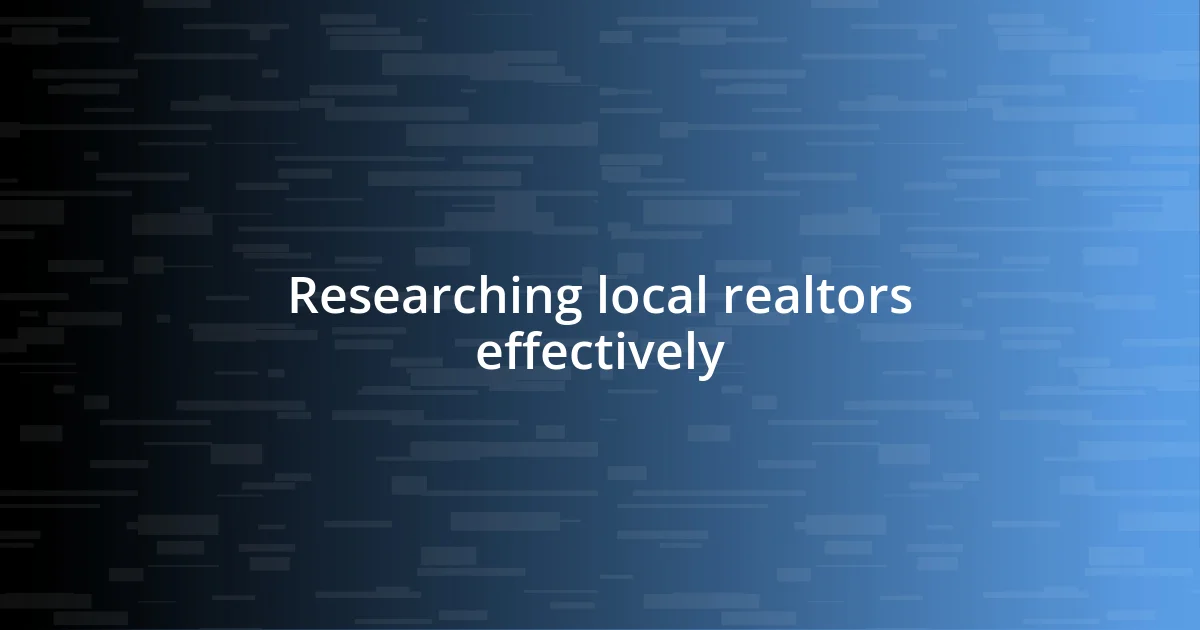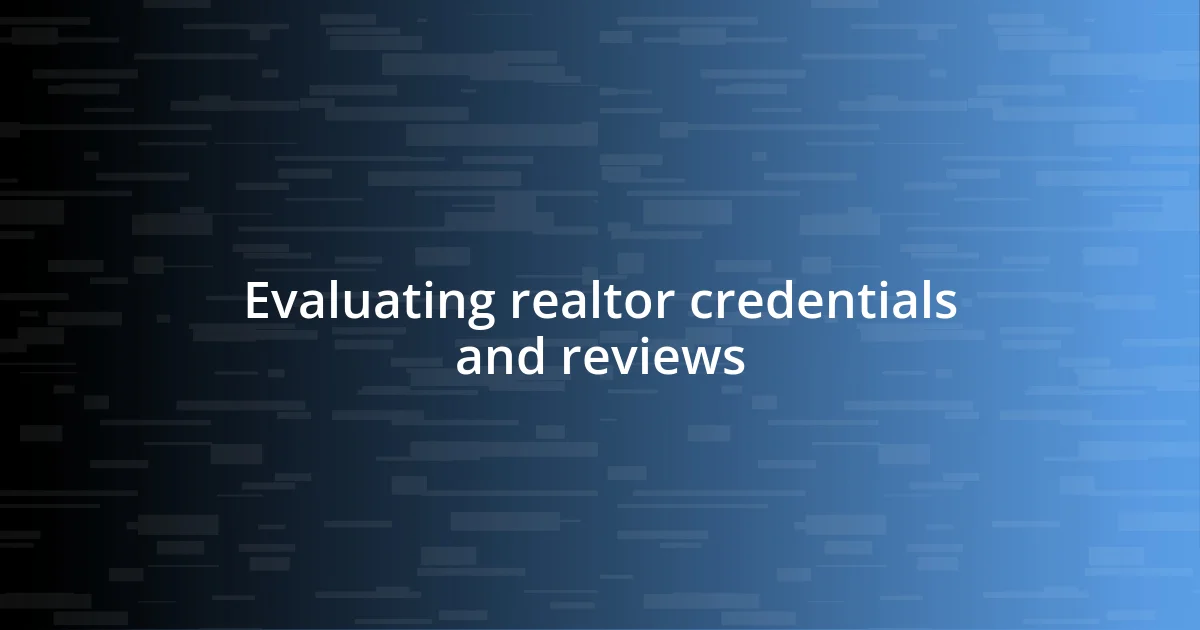Key takeaways:
- Identifying personal real estate needs involves reflecting on lifestyle aspirations and long-term goals, beyond just physical attributes of a property.
- Effective realtor research includes checking online reviews, engaging with local communities, and preparing targeted interview questions to assess compatibility.
- The final selection of a realtor should combine emotional connection and logistical considerations, ensuring they align with personal needs and budget expectations.

Identifying your real estate needs
Identifying your real estate needs is a personal journey that goes beyond just locations and price tags. I remember when I was searching for my first home; I created a list of must-haves and nice-to-haves. It was a game-changer—it helped me clarify what I truly valued in a space, like having a home office or proximity to parks.
Have you ever stopped to think about the lifestyle you want to live? Your real estate needs should reflect more than just physical space; they should also encapsulate your daily routine and future aspirations. For instance, when I considered moving closer to my job, I realized I needed a shorter commute, which led me to focus on neighborhoods that prioritized accessibility.
It’s also crucial to assess your long-term goals. Are you looking for a family home or an investment property? When I thought about my plans for the future, I made sure to look for properties that could accommodate a growing family, keeping in mind the potential for life changes. By being honest about my needs, I was able to make empowered decisions that truly aligned with my vision of home.

Researching local realtors effectively
Researching local realtors requires a strategic approach, and I learned this the hard way when I first ventured into real estate. I found that exploring online reviews and testimonials was incredibly helpful. Websites like Zillow and Realtor.com provided insights from other clients, which gave me a clearer picture of each realtor’s strengths and weaknesses. Seeing consistent praise for responsiveness or local market knowledge helped me narrow down my choices significantly.
Engaging with local community groups and social media was another eye-opener for me. I recall joining neighborhood Facebook pages where residents often discussed their experiences with realtors. These candid conversations, filled with warmth and genuine recommendations, guided me toward agents who truly understood the community’s charm. It was a reminder that real estate is, at its core, a people business.
When it comes to interviewing potential realtors, I suggest preparing a list of targeted questions. Think about what makes you feel comfortable and informed during the home-buying process. I remember asking a realtor how they handle negotiations and their approach to pricing strategies. Their answers not only revealed their worldviews but also helped me gauge whether we would work well together. It’s essential to find someone whose values and expertise resonate with you.
| Research Method | Pros |
|---|---|
| Online Reviews | Provides real client insights and highlights strengths |
| Community Engagement | Offers personalized recommendations and helps gauge local reputation |
| Direct Interviews | Allows for assessing compatibility and transparency in approach |

Evaluating realtor credentials and reviews
Evaluating a realtor’s credentials and reviews is an essential step in my journey to find the right agent. I was once overwhelmed by the number of options, so I started digging into their credentials—things like licensing, certifications, and experience in the field. This not only gave me peace of mind, but it also made me feel more confident about my eventual decision. A realtor’s history can say a lot about their reliability and local expertise.
When reviewing client feedback, I also paid attention to the emotions behind the words. For instance, on one review site, I stumbled upon a glowing review from a couple who had found their dream home after months of searching. They spoke not just of the agent’s skills but of how they felt genuinely cared for throughout the process. That kind of connection was something I realized I wanted in my realtor as well. Here are a few key aspects I focused on:
- Professional Licenses: Verify their licensing status to ensure they are legitimate.
- Certifications: Look for designations that indicate expertise, like ABR (Accredited Buyer’s Representative).
- Experience: Consider how long they’ve been in the business and their familiarity with your target area.
- Client Reviews: Read multiple reviews to get a well-rounded view of their strengths and weaknesses.
- Response Time: Note how quickly they respond to inquiries during your evaluation process.

Interviewing potential realtors thoroughly
I learned early on that the interview process is more than just answering questions; it’s about finding a connection. During my search, I met with a realtor who immediately set my mind at ease with their warm demeanor. I found myself wondering, “Can I trust this person to guide me through one of the biggest decisions of my life?” They encouraged questions, and their detailed responses left no room for doubt. It’s those moments of reassurance that can really signal a good match.
One essential aspect I focused on was their local market knowledge. I remember one realtor who came in prepared with specific data about recent sales in my preferred neighborhood. I couldn’t help but feel impressed. I asked them how they keep up with changing market trends, and their insights were clear and insightful. I learned that a thorough understanding of the area not only indicates their expertise but also their commitment to clients. If they’re not keeping current, how can I trust them to negotiate effectively on my behalf?
I also found it helpful to gauge their communication style. During one interview, I asked how often they would update me during the buying process. The realtor shared their strategy of frequent check-ins, which made me feel engaged and informed. I remember thinking how vital this was—after all, buying a home can feel overwhelming. Isn’t it comforting to know someone will be there every step of the way? By prioritizing my needs in our conversation, I realized I was on the right track to finding the perfect ally in my home search.

Making the final selection process
Selecting the right realtor felt like the final puzzle piece in my home-buying journey. After narrowing down my candidates, I took the time to reflect on how each agent made me feel during our discussions. I remember sitting with one realtor, sipping coffee, while they genuinely listened to my preferences and concerns. Their enthusiasm for finding me the right home was infectious, making me realize I needed someone who could match my excitement. Did I feel heard and valued? Absolutely, and that was a crucial element in my selection process.
I also leaned heavily on my gut feelings when making the final choice. More than once, I found myself comparing the interactions I had with different realtors. I vividly recall a moment during a follow-up call with one agent; they highlighted properties that aligned perfectly with my vision. Their personalized approach struck a chord within me—this was more than a transaction; it was about turning my dreams into reality. Trusting my instincts ultimately guided me toward a realtor who felt like a true partner in the journey.
Finally, I weighed the logistics of my options. As I sat down with my top choices, I mapped out their fees, the services they offered, and how those aligned with my budget. I frequently asked myself, “Am I getting the best value for this investment?” This diligent analysis combined with my emotional connection helped clarify my decision. By merging potential and emotion, I was finally able to choose a realtor who not only met my expectations but also stirred my excitement about the home-buying process ahead.














